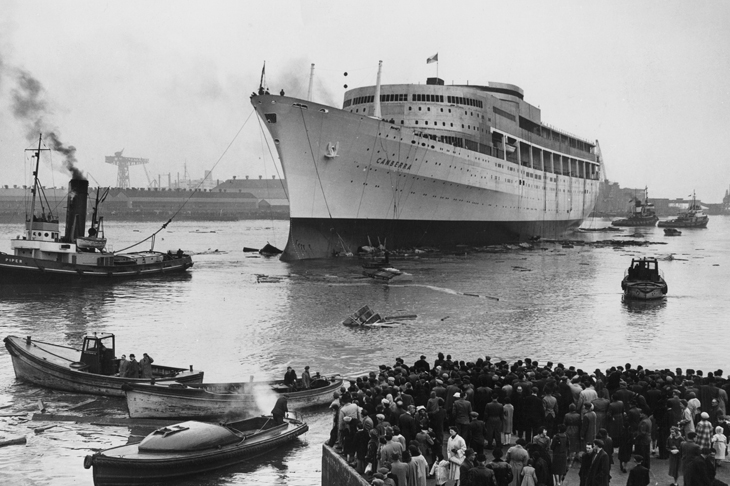Hankering for a return to the good old days when Britain was Australia’s biggest export market as the Poms consumed imported Australian food, wore Australian wool and Earl’s Court was Kangaroo Valley? Forget it. Brexit is not going to do it for you. Even before Britain gave Australia and the rest of the Commonwealth the flick in 1973 (after a failed attempt to do so in 1961-62) by joining what was then the Common Market, the old relationship was on the skids. Not only had Prime Minister Menzies’ trade minister John McEwen discovered Japan in the 1950s (to Australia’s huge economic benefit), but the Americans, with whom Australia was doing increasing business, were getting crotchety about the Empire Preference tariff regime that gave British rivals an edge over them in Australian markets. The pressure was mounting; statistics were already showing the beginnings of fundamental change in Australia’s trade relationship with Britain. By the mid-1960s Japan replaced Britain as Australia’s largest export market and has since given way to China.
Britain joining the Common Market quickened the process. Australia’s pursuit of other markets, particularly in South-East Asia, and its signing in recent years of free trade agreements, has meant that China has jumped from 8 per cent of our exports to almost 40 per cent and ‘other Asia’ from 3 per cent to 28 per cent. The different nature of those markets means that rural commodities have long-since ceased to dominate our exports, dropping from more than 40 per cent to barely 12 per cent while minerals and fuels have soared from 17 per cent to more than 50 per cent
So this month’s formal departure by Britain from what is now the European Union is not going to unscramble an egg that had already entered the mixing bowl by the time Britain belatedly opted for Europe over the Commonwealth 48 years ago. None of that diminishes the immense impact that Britain’s joining the Common Market had on Australia’s exports and particularly the rural industries. They instantly and directly suffered from the tariffs and quotas by which Europe’s Common Agricultural Policy protected and enhanced the fortunes of European farmers to the point of creating massive surpluses paid for by multi-billion euro levies on European taxpayers and consumers.
The inevitable consequence for Australia of Britain’s 1973 EU membership was that the UK’s one-quarter share of our total exports collapsed to a meagre 1.4 per cent. As Trade Minister Simon Birmingham laments: ‘In many areas of agricultural trade we went from being a significant supplier of goods to Britain to losing almost all our market share. During the past 48 years beef exports to Britain plummeted by 96 per cent, sheep meat by 70 per cent, rice by 92 per cent and wheat by 99 per cent. Exports of sugar and butter were eliminated’. Birmingham admits that Australia will ‘possibly not’ return to such volumes, because ‘Australian farmers now have better diversified markets’, but still reckons that ‘This lost trade of the past 48 years presents new opportunities for the future’. But the political reality is that it would take a brave British government to expose UK farmers to Australian competition after 48 years of CAP protectionism. As the UK National Farmers Union warned in campaigning against Brexit: ‘Two thirds of the UK’s farm income relies on direct payment support’. The CAP revolutionised British farming which responded to this subsidised profitability by massively increasing food production. This slashed the need for food imports that had constituted almost 40 per cent of UK total imports in the 1960s to only 10 per cent (three-quarters of which is met from other EU sources). So there is simply no prospect of Australian farmers winning back their former market share as their main rivals are British and Irish farmers, more than continental ones (who may however be open to some competition, depending on Brexit’s final terms).
But Australia will nevertheless ‘seek the elimination of tariffs, quotas and non-tariff barriers as widely as possible’ while Britain will try to win back some of its 1960s 28 per cent share of Australia’s imports which is now down to less than 5 per cent.
In your dreams…
Got something to add? Join the discussion and comment below.
Get 10 issues for just $10
Subscribe to The Spectator Australia today for the next 10 magazine issues, plus full online access, for just $10.
You might disagree with half of it, but you’ll enjoy reading all of it. Try your first month for free, then just $2 a week for the remainder of your first year.














Comments
Don't miss out
Join the conversation with other Spectator Australia readers. Subscribe to leave a comment.
SUBSCRIBEAlready a subscriber? Log in